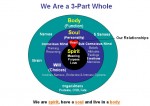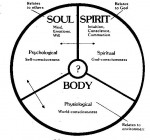The Bible seems to present humans as consisting of three parts: body, soul, and spirit (1 Thessalonians 5:23; Hebrews 4:12).
This is called the “tripartite” nature of man. Much like the divine Trinity, the three parts of a human make one being. Though distinct, the three parts of a person work together to live, exist, and interact with God and creation.

The Three Parts: Body, Soul, and Spirit
The body is the physical side of a person. It touches the material world through the five senses of sight, smell, hearing, taste, touch.
The spirit is the spiritual side of man. It interacts with God and the spiritual realm through its own set of “senses,” things like faith, hope, and prayer.
The soul is the life of a person. It is the animating principle of a person, and is responsible for imagination, memory, reason, and emotions. As such, the soul serves as the command center for the person. Neither the body nor the spirit can function on its own; both look to the soul for direction and action.
What Happened to the Three Parts of Humanity in the Fall?
When Adam and Eve sinned in the Garden of Eden, they died spiritually and sin corrupted their body, so that it too began to die.
Nevertheless, they remained “alive” because their soul remained. Yet the soul, the animating principle of a person, can only function through the spirit or through the body. The spirit, which was dead, could do nothing for the soul.
The body, however, was only dying, and so the soul could function through the body. Yet because of the corruption of sin, the body produced only sin and death. This is what Paul refers to as “the flesh.”
What Happens to the Three Parts of a Human in Regeneration?
In the Hebrew Scriptures, God promised to give a new spirit to His people (Ezek 36:26), which we now know was the “Holy Spirit” that came at Pentecost (Acts 2).
The Bible also says that in the future resurrection, we will be given glorified and incorruptible bodies (1 Cor 15:52). When that happens, each person will once again be as God intended and planned, perfect in body, soul, and spirit so that we can live and function as a whole, united person.
But that time is not yet.
In the present age, unbelievers have a soul which often seeks to do good, and wills to do good, but since they do not have the Holy Spirit, they cannot do anything to please God. And since their body is corrupted with sin, the soul cannot obey God through the flesh either.
Once a person believes in Jesus for eternal life (this is a function of the soul), God sends the Holy Spirit to regenerate, indwell, baptize, and seal the new believer. The old, dead spirit of man is replaced by the Holy Spirit of God.
As a result, the soul of believer can choose to walk in the Spirit or walk in the flesh (Gal 5:16-26). Yet due to the force of habit, addiction, bad choices, or just plain ignorance, we often choose instead to life through the flesh, which results in sin.
Though we may desire to do something else, and now have the ability through the Spirit to actually live differently, the body of sin drags us down into death and destruction with it (Rom 7:24).
We will see tomorrow why this study is important (It helps us understand what Paul is talking about in Romans 7).
Here are a few images which I found online which seem to show what I am saying in a graphic representation of our three parts:
Have you read or studied much about the three parts of man? Some believe we have only two parts: the body and a soul/spirit. What are your thoughts on the three parts of man? Do you have anything to add to what I have written above?







 Yesterday we look at
Yesterday we look at  But in the Psalmist’s day, there was no such thing as atheism. Everybody believed in a God or gods. There were, however, many people who chose to live “godless” lives, that is, to live for themselves and not serve God. They believed that God existed, but they chose to not obey Him or follow His commands. It is this sort of person that the Psalmist has in mind in Psalm 14:1 (cf. 53:1).
But in the Psalmist’s day, there was no such thing as atheism. Everybody believed in a God or gods. There were, however, many people who chose to live “godless” lives, that is, to live for themselves and not serve God. They believed that God existed, but they chose to not obey Him or follow His commands. It is this sort of person that the Psalmist has in mind in Psalm 14:1 (cf. 53:1).

 Of all the various texts used to defend the Calvinistic teaching on Total Depravity, Romans 3:9-20 is one of the most popular (another being Ephesians 2:1-3). Rather than quote the entire passage, a few select verses from the beginning of this section are representative of the whole.
Of all the various texts used to defend the Calvinistic teaching on Total Depravity, Romans 3:9-20 is one of the most popular (another being Ephesians 2:1-3). Rather than quote the entire passage, a few select verses from the beginning of this section are representative of the whole.
 Up to this point, Paul’s objector was trying to argue that only the Gentiles were guilty, and that the Jewish people had a privileged status before God. Paul’s point in Romans 3:9-20 is that if the Jewish people did have a privileged position by virtue of having the “oracles of God” (Romans 3:2), then these oracles of God condemn them all as sinners, which puts them right back on equal footing with the Gentiles.
Up to this point, Paul’s objector was trying to argue that only the Gentiles were guilty, and that the Jewish people had a privileged status before God. Paul’s point in Romans 3:9-20 is that if the Jewish people did have a privileged position by virtue of having the “oracles of God” (Romans 3:2), then these oracles of God condemn them all as sinners, which puts them right back on equal footing with the Gentiles. 

 Just as a branch cannot bear any fruit unless it remains attached to the vine, so also, the disciples of Jesus will not be able to accomplish anything for the kingdom of God unless they remain connected to Jesus by looking to Him for guidance and direction.
Just as a branch cannot bear any fruit unless it remains attached to the vine, so also, the disciples of Jesus will not be able to accomplish anything for the kingdom of God unless they remain connected to Jesus by looking to Him for guidance and direction.

 The consistent message of Jesus to the Jewish people is that if they continued to reject Him as the Messiah, they would eventually become completely blind to His message and ministry.
The consistent message of Jesus to the Jewish people is that if they continued to reject Him as the Messiah, they would eventually become completely blind to His message and ministry.